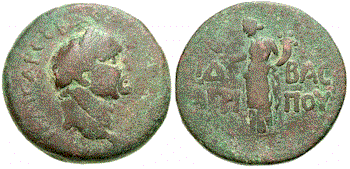Last ruler from the house of Herod. Great-grandson
of Herod the Great through both his father
[Agrippa I]
& mother [Cypros, the daughter
of Salampsio], Agrippa II
was, like his father & paternal grandfather, raised in the
imperial household in Rome. Only 16 when his father died (44 CE), he
was too young to be named king of the volatile kingdom of Judea.
But six years later, the emperor Claudius
put him in charge of the Lebanese kingdom of Chalcis, that had been
vacated by the death of his uncle, Herod
(48 CE). Agrippa's support of Jews in their feud with Samaritans
(52 CE) led Claudius to replace the procurator of Judea [Cumanus] &
give Agrippa control of the Syrian provinces [Golan,
Batanea & Trachonitis] that had previously been governed by his
father & great-uncle [Philip].
Like his father & uncle, he retained the title of
"king." When Nero
became emperor (54 CE), he expanded Agrippa's kingdom to include Perea
and the west shore of the sea
of Galilee, territory that
had belonged to the domain of his father & another great-uncle [Antipas].
Although his reign was the longest of any member of the Herodian
dynasty, he never ruled Judea,
Samaria
or the bulk of Galilee.
Yet, his sister, Drusilla,
became wife of a Roman procurator of Judea [Antonius
Felix]. Though Claudius made him
administrator of the temple in Jerusalem, Agrippa himself was
not a religious Jew & created scandal among Jewish subjects by
continuing his incestuous relationship with another sister, Berenice. That scandal is
not mentioned, however, in Luke's account of the
apostle Paul's favorable audience before the pair on the eve of his
deportation to Rome [Acts 25-26].
Since Agrippa sided with Rome in the great Jewish revolt (66-70 CE), his position was reconfirmed by Roman emperors
after Nero.
References: Josephus,
Antiquities
19.360-362;
20.9-12,
104,
135-140,
189-203,
211-214.
_____, War
2.220-223,
245-247,
335-407,
523-526;
3.56-57.
_____, Life
34-39,
74,
114,
340-367,
381-398.
Other resources on line:
![]()
![]()

![]()
![]()
![]() Perspective on the
World of Jesus
Perspective on the
World of Jesus ![]()